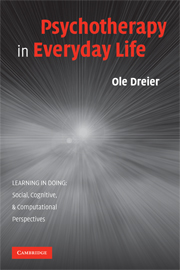Book contents
- Frontmatter
- Contents
- Series Foreword
- Preface
- Introduction
- 1 Re-Searching Psychotherapy as a Social Practice
- 2 Theorizing Persons in Structures of Social Practice
- 3 A Study – Its Design and Conduct
- 4 Clients' Ordinary Lives Plus Sessions
- 5 Therapy in Clients' Social Practice across Places
- 6 Changes in Clients' Practice across Places
- 7 Changing Problems across Places
- 8 The Conduct of Everyday Life and the Life Trajectory
- 9 The Children's Changing Conducts of Everyday Life and Life Trajectories
- 10 The Parents' Changing Conducts of Everyday Life and Life Trajectories
- 11 The Changing Conduct of Everyday Family Life and Family Trajectory
- 12 Research in Social Practice
- References
- Author Index
- Subject Index
- Learning in Doing: Social, Cognitive, and Computational Perspectives
- References
References
Published online by Cambridge University Press: 15 December 2009
- Frontmatter
- Contents
- Series Foreword
- Preface
- Introduction
- 1 Re-Searching Psychotherapy as a Social Practice
- 2 Theorizing Persons in Structures of Social Practice
- 3 A Study – Its Design and Conduct
- 4 Clients' Ordinary Lives Plus Sessions
- 5 Therapy in Clients' Social Practice across Places
- 6 Changes in Clients' Practice across Places
- 7 Changing Problems across Places
- 8 The Conduct of Everyday Life and the Life Trajectory
- 9 The Children's Changing Conducts of Everyday Life and Life Trajectories
- 10 The Parents' Changing Conducts of Everyday Life and Life Trajectories
- 11 The Changing Conduct of Everyday Family Life and Family Trajectory
- 12 Research in Social Practice
- References
- Author Index
- Subject Index
- Learning in Doing: Social, Cognitive, and Computational Perspectives
- References
Summary

- Type
- Chapter
- Information
- Psychotherapy in Everyday Life , pp. 315 - 326Publisher: Cambridge University PressPrint publication year: 2007

